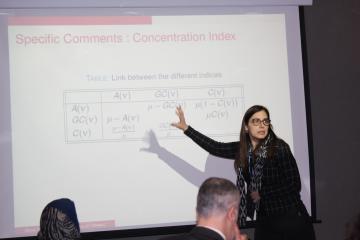
Beirut, 20 February 2019 (ESCWA)--Work is underway to issue a report on ‘Rethinking Inequality in Arab States’. Regional and global experts discussed the findings of the report, prepared jointly by the United Nations Economic and Social Commission for Western Asia (ESCWA) and the Economic Research Forum (ERF).
On 18-19 February, the expert meeting on ‘Multidimensional Inequality in Arab Countries’ discussed the forthcoming report with the aim to feed into it and the future work of ESCWA. The accomplishments on these objectives might also lead the region in progressing toward achieving many of the Sustainable Development Goals (SDGs), particularly those related to poverty reduction, decent employment and inclusive productive growth.
“Inequality in economic and social outcomes has received heightened attention since 2010 as the underlying root causes of the Arab uprisings emerged as a topic of interest within academic and policy circles” said the Director of the Economic Development and Integration Division (EDID) at ESCWA, Mr. Mohamed El Moctar Mohamed El Hacene, in his opening remarks.
The upcoming report builds on the recent report on Arab Multidimensional Poverty. Mr. El Hacene noted the unique opportunity to examine trends in outcome and opportunity inequalities across time and inequality between rich and poor wealth quintiles, men and women, rural and urban areas, and households with highly educated and uneducated heads.
“This will not only fill a significant void in the current body of research, but it will also help to evaluate the impact of socio-economic policies over the past decade. At the heart of this task is the question of the effectiveness of public policy in Arab states” he added.
Discussions touched on inequality in health, education and gender.
An overall improvement in health indicators despite persisting gaps in health outcomes across socio-economic characteristics is noticed in most Arab countries. Water and sanitation remain highly unequal between rural and urban regions in most countries. Declining inequality in health indicators and a significant increase in overweight and skilled birth attendance are noted in opposition to persisting inequalities in most countries.
As for education, primary school enrolment shows significant improvement across Arab countries. However, while inequality in attending primary school has decreased in the region, it remains more persistent for higher education.
Similarly, the gender gap is almost closed in primary and secondary education, but stays the highest in the world for labor, as women are more likely than men to be unemployed in the Arab region, same inequality for health and access to health services which subsequently affects women’s health and the health of future generations.
For more information:
-Nabil Abu-Dargham, Head, ESCWA Communication and Information Unit,
+961-70-993-144; email: dargham@un.org
-Ms Rania Harb, Public Information Assistant, +961-70-008-879; email: harb1@un.org





